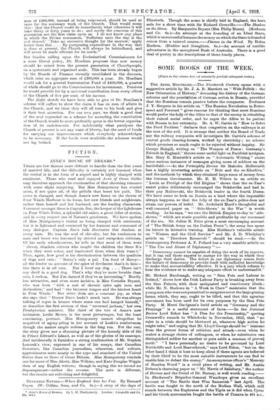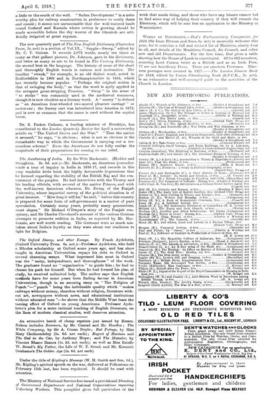SOME BOOKS OF THE WEEK.
[Notice in this column does not necessarily preclude subsequent review.] New Orientation of History," discussing the history of the German colonies and the possibilities of German action in Russia, provided that the Russians remain passive before the conqueror. Professor J. Y. Simpson in. his article on "The Russian Revolution in Retro- spect and Forecast" gives reasons for thinking that most Russians would prefer the help of the Allies to that of the enemy in rebuilding their ruined social order, and he urges the Allies to be patient with Russia in her extremity. Mr. A. W. Gattie in "How to Solve the Food Problem" declares that congestion on the railways is at the root of the evil. It is strange that neither the Board of Trade nor the railway companies will investigate Mr. Gattie's scheme of central goods clearing-houses, worked by electricity ; no scheme which promises so much ought to be rejected without inquiry. Sir George Makgill, writing on "The Weapon of Peace : Germany's Friends in England," throws some useful light on Pacificist intrigues. Mrs. Mary E. Monteith's artiole on "Automatic Writing," states some curious instances of messages giving news of soldiers on the battlefield.—In the Fortnightly Review Sir Malcolm Malwraith has a highly interesting article on "Bob and the ex-Khedive," and the methods by which they obtained large sums of money from the German Government. Mr. E. H. Wilcox in. an article on "Lenin as Prot6g4 of the Old " shows that the ex-Tsar's secret police deliberately encouraged the Bolsheviks and had in their pay Malinovski, the Bolshevik leader in the fourth Duma. We have come to look on Russia as a land where the impossible always happens, so that the folly of the ex-Tsar's police does not strain our powers of belief. Mr. Archibald Hurd's thoughtful and well-reasoned paper on " Side-Shows ' in the War" is worth reading. As he says, "we owe the British Empire to-day to ' side- shows,' " which are made possible and profitable by our command of the sea. Mr. Julius M. Price gives a most encouraging account of "The British Army on the Italian Front"; the army has spent its leisure in intensive training. Miss Haldan.e's valuable article on "Women and the Civil Service" and Mr. J. D. Whelpley's article on "Theodore Roosevelt" should be read.—In the Contemporary Professor A. F. Pollard has a very sensible article on "The Use and Abuse of Diplomacy" :—
" Democracy cannot be capable of doing the work of its experts, but it can call those experts to a.nsw.er for the way in which they discharge their duties. The defect in. our diplomacy comes from the failure of democracy to provide itself with sufficient knowledge to make that accountability effective. It is a jury which refuses to hear the evidence or to mace any adequate effort to understand it."
Mr. Michael Macdonagh, writing on "Sinn Fein and Labour in. Ireland," shows how the Irish Labour Party is breaking away from the Sinn Feiners, with their antiquated and reactionary ideals ; while Mr. N. Marlowe in "A Week in Clare" maintains that the young men who were not permitted to emigrate covet the large grazing farms, which, they say, ought to be tilled, and that this agrarian movement has been used for its own purposes by the Slim Fein Party. M. Henri Davigne.n's lucid article on "Germany and the Flemings" is a useful statement of facts.—In the National Review Lord Esher has "A Plea for the Premiership," quoting Cromwell's remark to Whitelocke in November, 1652, that "no ruler in a crisis should be blottered at, whatever high action he might take," and urging that Mr. Lloyd George should be" immune from the grosser forms of criticism and attack—even when he makes a strange choice of colleagues, or when he substitutes one distinguished soldier for another or puts aside a seaman of proved merit." "I have personally no desire to be governed by Lord Northcliffe and Lord Beaverbrook," says Lord Esher, "but on the other hand I think it best to keep silent if these agents are believed by their Chief to be the most suitable instruments he can find to enable him to defeat the enemy." An anonymous officer's" Memory of Bonrlon Wood" is a vivid piece of writing, and Mr. Austin Dobson's charming paper on "Mr. Harris of Salisbury," the author of Hermes and the friend of Dr. Burney, is well worth reading.— In Blackwood's Brigadier-General Wauettope gives an excellent account of "The Battle that Won Samarrah " last April. The battle was fought to the north of the Median Wall, which still stands between the Euphrates and the Tigris as it did when Cyrus and his Greek mercenaries fought the battle of Cunaxa in 401 B.C.,
a little to the south of the wall. "Sudan Development" is a note- worthy plea for railway construction in preference to costly dams and canals ; it seems not unreasonable that the well-watered lands round Gedaref and Kassala where cotton is growing should be made accessible before the dry wastes of the Ghezireh are arti- ficially irrigated at great expense.



























 Previous page
Previous page